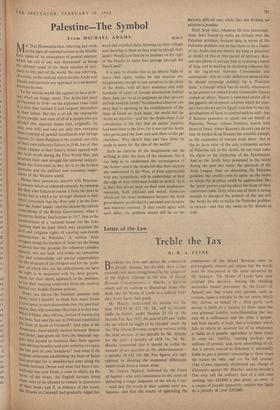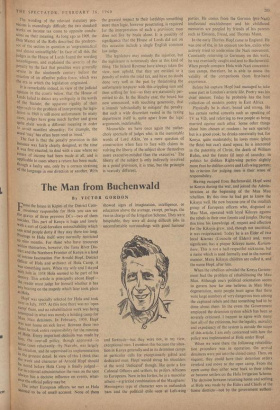Letter of the Law
Trcbk the Tax
By R. A. CLINE
BETWEEN tax laws and justice the conne,nion is already tenuous, but the little there is has assuredly not been strengthened by the judgment of t.hii highest tribunal in the case of inland Revenue Commissioners v. Ilinelty, a decisi.M which will do nothing to discourage those who think that the House of Lords as a judicial body' does more harm than good.
Mr. Hinchy understated his income for the year 1952-53 by E32 19s. 6d., and so_ became liable to forfeit, under Section 25 (3). of the Income Tax Act, 1952, the sum of £20 and 'treble the tax which he ought to be charged' under the Act. The Inland Revenue sought to recover treble the total amount of tax payable by Mr. Hinchy for the year-----a penalty of £438 14s. 9d. Mr. Hinchy contended that . it should be treble the amount of tax payable on the understatement— a penalty of £42 15s. Od. The figures are only relevant in showing the enormous differences which result from a minor error.
'Mr.. Justice Diplock, followed by the Court of Appeal--who were unanimous to the point of delivering a single judgment of the whole Court --held that the words in their context were am- biguous, and that the results of upholding the
contentions of the Inland Revenue were so extravagantly absurd and unjust that the words must be interpreted in the sense advanced by the taxpayer. The House of Lords have now reversed this decision. Among the resulting anomalies (noted previously by the Court of Appeal) are that where two persons, such as trustees, make a mistake in the tax return which they deliver on behalf of a third party, each person is liable to a penalty of three times his own personal liability, notwithstanding that one may be a millionaire and the other a pauper, and both equally at fault; that a company which fails to return an accurate list of its employees is liable to a penalty equivalent to three times its own tax liability, running perhaps into millions of pounds; and, most astonishing of all, that a person treated as dishonest is admittedly liable to pay a penalty amounting to three times the excess tax only, and ,wt the full amount. (The Crown expressly disclaimed any charge of dishonesty against Mr. Hinchy—and no wonder.) One may add the ordinary case of a rich man earning, say, £10,000 a year gross; an error af a couple of pounds apparently renders him liable to a penalty of over £20,000! The wording of the relevant statutory pro- visions is exceedingly difficult; the two standard Works on income tax come to opposite conclu- sions on their meaning. As long ago as 1909, the then Master of the Rolls described the predeces- sor of the section in question as 'ungrammatical and almost unintelligible.' In face of all this, the judges in the House of Lords found the wording unambiguous, and explained the severity of the Penalty by the fact that penalties were gmerally severe in the nineteenth century before the creation of an effective police force, which was the era in which the legislation originated. It is remarkable indeed, in view of the judicial opinion in the courts below, that the House of Lords failed to detect any ambiguity in the words of the Statute; the apparent rigidity of their approach to the problem of interpreting the legis- lation in 1960 is still more unfortunate. In many eases, judges have gone much further and given cloae plain words a different meaning in order to avoid manifest absurdity; for example, the Word 'may' has often been read as 'must.'
The fact is that the penalty provision in this instance was fairly clearly designed, at the time it was first enacted, to deal with a case where no return of income had been made at all, and is applicable to cases where a return has been made, though a faulty one, only by a certain straining of the language in one direction or another. With
the greatest respect to their lordships something more than logic, however penetrating, is required for the interpretation of such a provision; man does not live by brain alone. It is possibly of significance that the House of Lords did not on this occasion include a single English common law judge.
The legislature may remedy the injustice, but the legislature is notoriously slow at this kind of thing. The Inland Revenue have always taken the view, now upheld, that they are entitled to a penalty of treble the total tax, and have no doubt done very well in the past by threatening the unfortunate taxpayer with this crippling sum and then settling for less--as they are statutorily per- mitted to do. In the Hinchy case, the board has now announced. with touching generosity, that it intends 'substantially to mitigate' the penalty. But such a wide discretion vested in the taxing department itself is, quite apart from the legal arguments, indefensible.
Meanwhile, we have once again the melan- choly spectacle of judges who, in the memorable words of Lord Atkin, 'on a mere question of construction when face to face with claims in- volving the liberty of the subject show themselves more executive-minded than the executive.' The liberty of the subject is only indirectly involved in a penal provision, it is true, but the principle is scarcely different.



































 Previous page
Previous page